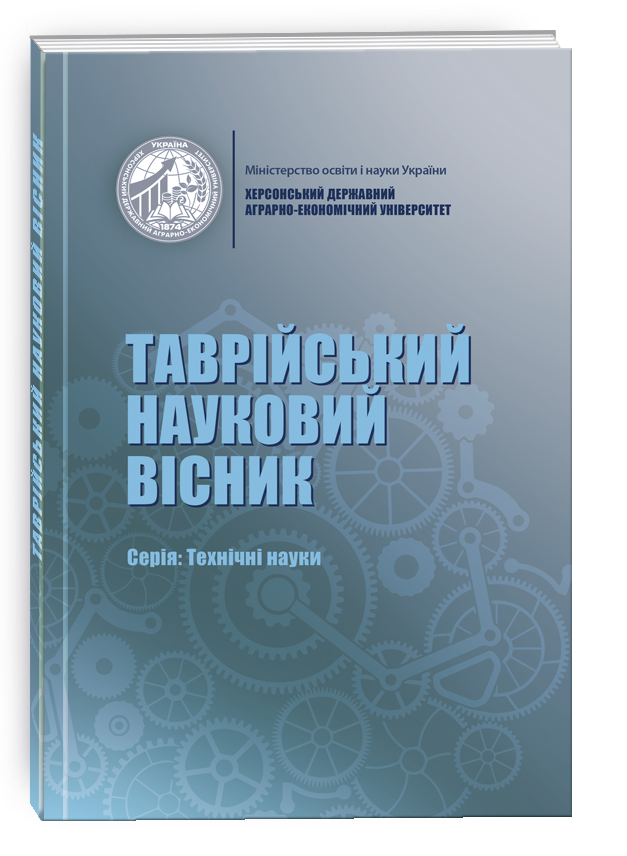SPECIFICITIES OF UNDERSTANDING ONLINE LECTURES BY STUDENTS OF FOOD TECHNOLOGY SPECIALTIES
DOI:
https://doi.org/10.32782/tnv-tech.2025.1.26Keywords:
food technology, online education, distance learning, hybrid education, online lectures, understanding, Internet texts, Internet psychology, cyberpsychologyAbstract
The article is devoted to the problem of the specifics of understanding online lectures by students of food technology specialties. The author notes that the rapid development of Internet technologies, the global epidemic and the war in Ukraine contributed to the rapid popularization of online, distance and hybrid learning. The widespread distribution of the distance format in early 2020 against the background of the lack of technical and psychological readiness for such a format led to the spread of the myth about the low effectiveness of online education.Currently, the situation is changing radically, experts are increasingly recognizing online education as more effective than traditional learning formats. However, in the minds of non- specialists (in particular, parents of modern students), this myth still holds strong. Its persistence is facilitated by the low level of digital literacy and psychological unpreparedness to perceive new technologies. Therefore, studying the specifics of understanding online lectures by students of food technology specialties within the psychology of Internet texts understanding is extremely necessary. To achieve this goal, a number of theoretical, empirical and interpretative methods were used. Among the theoretical methods, the methods of analysis, synthesis, comparison, generalization, concretization, classification, abstraction and modeling were applied. The empirical part of the study was implemented through observation. The participants of the observation were 42 students of food technology specialties of the Kherson State Agrarian and Economic University, who attended online lectures during the spring and fall semesters of 2024.The collected empirical material was studied using interpretive methods of structural, systemic, functional and genetic approaches. As a result of the study, it was concluded that understanding online lectures is significantly different from understanding offline lectures. Traditional methods of activating attention and using visuality on the Internet can have the opposite effect. It has been empirically confirmed that in the process of reception, the perception of online information occurs due to vision and hearing, but the possibility of activating the olfactory and gustatory cortex using association exercises significantly increases the efficiency of reception. At the stage of interpretation in cyberspace, the processes of thinking, memory and speech obey the laws of browsing and the bubble filter, but skillful use of these laws allows you to significantly increase the effectiveness of interpretation. At the stage of emotional identification, specially organized work on the emotional processing of the material will contribute not only to improving the effectiveness of learning, but also to the formation of closer emotional relationship with the student group.
References
Apostolou, Z. T. (2022). Continuities, Discontinuities and Transition in Early Childhood Literacy Education at Digital Time. Preschool Education: Global Trends, 2, 64–93. https://doi.org/10.31470/2786-703X-2022-2-64-93
Banerjee, S. (2020). To capture the research landscape of lecture capture in university education. Computers&Education, 30. URL:https://doi.org/10.1016/j. compedu.2020.104032.
Dommett, E. J., Gardner, В., Tilburg, W. (2020). Staff and students perception of lecture capture. The Internet and Higher Education, 46. https://doi.org/10.1016/j. iheduc.2020.100732.
Hodges, Ch., Moore, S., Lockee, B., Trust, T., Bond, A. (2020). The difference between emergency remote teaching and online learning. Educause Review. https:// er.educause.edu/articles/2020/3/the-difference-between-emergency-remote-teaching- and-online-learning.
Horovitz, T., Mayer, R. E. (2021). Learning with human and virtual instructors who display happy or bored emotions in video lectures. Computers in Human Behavior, 119. https://doi.org/10.1016/j.chb.2021.106724.
Kireev, B., Zhundibayeva, A, Aktanova, A. (2019). Distance Learning in Higher Education Institutions: Results of an Experiment. Journal of Social Studies Education Research, 10 (3), 387–403.
Mercader, C., Gairín, J. (2020). University teachers’ perception of barriers to the use of digital technologies: The importance of the academic discipline. International Journal of Educational Technology in Higher Education, 17 (1). https://doi.org/10.1186/ s41239-020-0182-x.
Orr, D., Weller, M., Farrow, R. (2018). Models for online, open, flexible and technology enhanced higher education across the globe – a comparative analysis. International Council for Distance Education. http://oro.open.ac. uk/55299/1/Models- report-April-2018.pdf.
Ponce-Gómez, J., Zych, I., & Rodríguez-Ruiz, J. (2023). Problematic Internet use by children and adolescents from the parental perspective before and after the lockdown due to COVID-19. Psychology, Society & Education, 15(1), 11–19. https:// doi.org/10.21071/pse.v15i1.15324
Prestes, Z., Pirola, J., & Silva, G. (2023). Communication of Children of Preschool and School Age during Distance Learning in the Conditions of COVID-19. Preschool Education: Global Trends, 3, 30–42. https://doi.org/10.31470/2786-703X- 2023-3- 30-42
Spitzer, М. (2012). Digitale Demenz. Wie wir uns und unsere Kinder um den Verstand bringen. Droemer Knaur, München 2012, ISBN 978-3-426-27603-7.
Surma, T., Kirschner, P. A. (2020). Virtual special issue computers in human behavior technology enhanced distance learning should not forget how learning happens. Computers in Human Behavior. https://doi.org/10.1016/j. chb.2020.106390.
Wekerle, C., Daumiller, M., Kollar, I. (2020). Using digital technology to promote higher education learning: The importance of different learning activities and their relations to learning outcomes. Journal of Research on Technology in Education. https://doi.org/10.1 080/15391523.2020.1799455.
Акімова, Н.В. (2020). Психологія розуміння текстів інтернету. Монографія. Вінниця.
Борисова, Н. В.(2010). Образовательные технологии как объект педагогического выбора. 145 с.
Брюховецька, О. В. (2012). Інноваційний формат університетської лекції в сучасному освітньому процесі. Післядипломна освіта в Україні, 2, 50–54.
Вензенко, А., Шаповалова О. (2023). Характеристика засобів мережі інтернет у розвитку зв’язного монологічного мовлення дітей старшого дошкільного віку. Дошкільна і початкова освіта: реалії та перспективи. 49–53.
Даниліна, С.О. (2023). Переваги та недоліки дистанційного навчання в умовах воєнного стану. Забезпечення якості вищої освіти: проблеми та перспективи розвитку, 5, 122–124.
Єгорова, О. В. (2021). Особливості читання лекцій онлайн. Освітня аналітика України, 2 (13), 70–81. DOI: 10.32987/2617-8532-2021-2-70-81
Зеленов, Є. А. (2018). Цифрове покоління: ризики, переваги, засоби взаємодії. Духовність особистості: методологія, теорія, практика, 5 (86). 67–82.
Красюк, Ю.М., Сільченко, М.В. (2022). Адаптація дистанційних курсів до онлайнового навчання в кризових умовах. Перспективи та інновації науки, 9 (14), 197–210.
Крупенина, Н.А. (2023). Роль викладачів у нову епоху дистанційного навчання та штучного інтелекту. Актуальні питання у сучасній науці, 10 (16).
Курінна, С. М. (2004). Особливості соціалізації дітей шести-семи років у різних умовах життєдіяльності [кандидатська дисертація, Луганський державний педагогічний університет].
Лещенко, Л. (2006). Комп’ютерна залежність у дітей: виникнення і запобігання. Психолог,18–19. 258–259.
Лобач, Н., Саєнко, М., Ісичко, Л. (2023). Впровадження інноваційних педагогічних технологій у вищій освіті для забезпечення якісного дистанційного навчання в умовах воєнного стану. Актуальнi питання гуманітарних наук, 61(2), 255–259.
Нечитайло, О., Колотило, О. (2021). Зміни в сучасному університеті: виклики сьогодення та тенденції розвитку в умовах онлайн навчання. Буковинський медичний вісник, 25 (4). https://doi.org/10.24061/2413-0737.XXV.4.100.2021.22
Пихтіна, Н. П., Лісовець, О. В., Бобро, Л. В. (2022).Особливості впливу засобів масової інформації на соціалізацію дошкільників. Наукові записки. Серія «Психолого-педагогічні науки" (Ніжинський державний університет імені Миколи Гоголя), (4), 24–32. https://doi.org/10.31654/2663-4902-2022-PP-4-24-32
Хомська, Ю. (2014). Вплив мультиплікаційних фільмів на формування гендерних стереотипів у дітей молодшого шкільного віку.
Хорунжий, С. (2021). Онлайн-освіта вже даність: як покращити якість дистанційного навчання.
Шевчук, Г. Й. (2021). Дистанційне навчання у вищій школі: переваги, недоліки, перспективи. Науковий часопис Національного педагогічного університету імені М. П. Драгоманова. Серія 5 : Педагогічні науки : реалії та перспективи, 79 (2), С. 205–209. – DOI https://doi.org/10.31392/NPU







